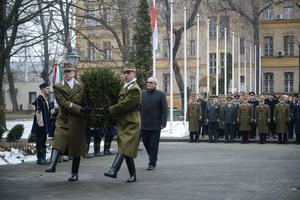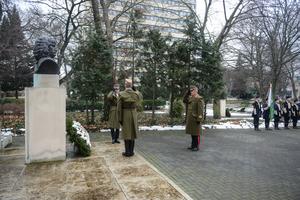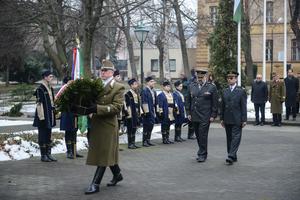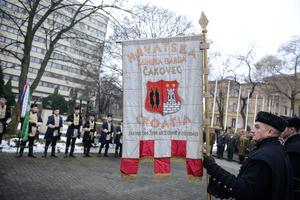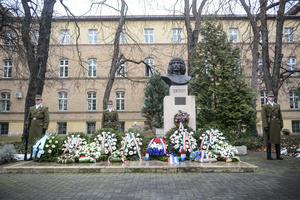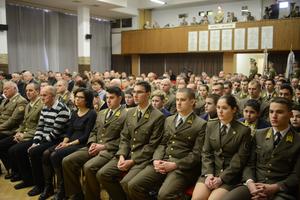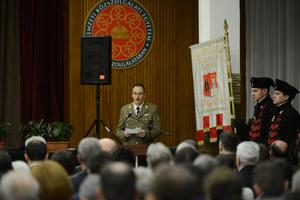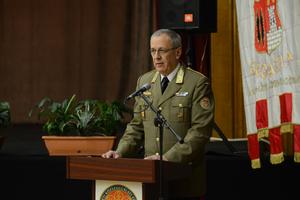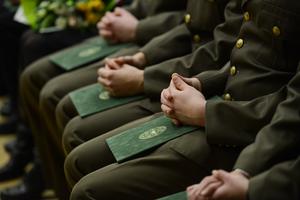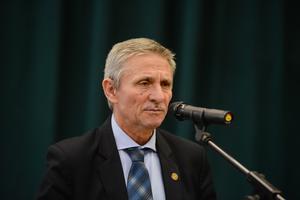The Faculty of Military Sciences and Officer Training held a ceremony - with the presence of several Hungarian and Croatian local government leaders - to commemorate Miklós Zrínyi, poet-general, where wreaths were also placed at the statue of Zrínyi.
Lieutenant colonel Gábor Hausner opened the event by saying that “usually we remember the famous Winter Campaign, the 1664 burn down of the bridge at Eszék, but it is also important to talk about the general’s grandiose military reform ideas”. He added that Zrínyi played an important role in creating an international cooperation against the Ottoman Empire and with this act, he gave hope to the Christian communities, as it was written in the letter of Pope Alexander VII. In a book published in London in 1664, the author described Zrínyi as a leader who can hold together the weakened Christianity and as such, he is the key to the survival or the failure of the Western world and Europe. It was interesting to see that the poet-general could present both a political and military programme that was well received within the Christian community. One of the major elements of this programme was the need for cooperation of the Christian world against the Ottoman Empire. The other main point was that the war should have been initiated by the Hungarian with the reform of the military. To implement these ideas, Zrínyi had to construct Zrínyi-Újvár and launch the winter campaign. According to Mr. Hausner, the war against the Turks helped Zrínyi to write his poets and works on military science, in which he formulated his ideas on the reform of the Hungarian military. “In the military reform, Zrínyi stated that the generals and officers have had an important role. According to Zrínyi, a good commander should have, alongside the leadership virtues and intellectual capabilities, experience, practice and the power of anticipation” - added the expert. He further highlighted that the works of the poet-general may be considered as a historical predecessor of the Zrínyi 2026 programme.
Árpád Pohl, dean of the Faculty of Military Sciences and Officer Training, added that the cult of Zrínyi is still present these days and that, in accordance with Zrínyi, the defence of the country is only possible with well prepared, well equipped and efficient forces. The dean stressed that a strong army should work for maintaining peace and not participating in war and that is exactly the mission of today’s Hungarian forces. He also pointed out that with the Zrínyi 2026, comprehensive defence development programme, the high-tech military equipment will be introduced in the military. It is also important to continuously develop the quality of research and education and as part of this, the university aims to increase the number of students studying abroad for a few months’ period before graduating.
During the event, several recognitions were also presented. Colonel Mátyás Palik, head of the Institute of Military Aviation and lieutenant colonel József Téglási, senior lecturer of the Institute of Military Leadership Training received the Miklós Zrínyi Ring. Lieutenant Balázs Taksás was awarded with the title of Best Lecturer of the Faculty. This year the Miklós Zrínyi award was presented to captain Miklós András Szabó, assistant lecturer of the Institute of Military Maintenance by Péter Vass, mayor of Szigetvár. Last but not least, Eng. Major General József Padányi said that those who participated in the commemoration are linked to each other by their respect shown for Miklós Zrínyi, who created a unique legacy in the Hungarian military history. “It is of an utmost importance for us to preserve and promote the Zrínyi legacy” - said the Vice-Rector for Science. He also highlighted that next year will be the 400th anniversary of Zrínyi’s birth, thus the university would like to celebrate that in a good way.
During the open day of the Faculty, several institutes and organisations have placed wreath on the statue of Zrínyi, for instance the Ministry of Defence, the Hungarian Defence Forces, the Faculty of Military Sciences and Officer Training, the Ludovika Battalion, the Croatian Defence Academy and the representatives of several Hungarian and Croatian local governments, including Legrad, Čakovec, Szigetvár, Belezna and Murakeresztúr.

